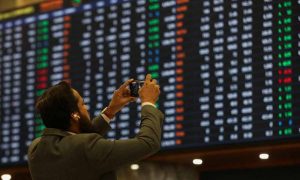ISLAMABAD: Investors had been hopeful for a positive outcome from discussions between the government and IMF regarding gas circular debt. However, the sustained run up in the stock market has raised questions due to the ongoing depreciation of the rupee, which has severely shaken confidence. Market participants are anticipating an early announcement of the monetary policy, foreseeing a 200 basis point increase in the interest rate to a record high of 24 percent.
During the week, the stock market’s 100 index experienced a decline of 547 points, marking a 1.1 percent decrease to close at 47,671 points. Foreign investors continued their buying spree with a net purchase of $1.7 million compared to $2.4 million in the previous week. Trading volumes averaged 232 million shares, down 32.6 percent from the previous week, while the average traded value settled at $32 million, reflecting a 36 percent decrease.
Muhammad Rizwan Khan, Director of Brokerage at Chase Securities, noted that the market’s depressive performance during the past week was influenced by uncertainties surrounding gas sector reforms, substantial dividends from Exploration & Production (E&P) companies, unexpected currency devaluation, and apprehensions of further interest rate hikes. Additionally, the rollover of contracts at the end of the month exerted negative pressure on the KSE-100 Index, as the rollover amount for August was 25% higher than that of July.
Rizwan commented, “The absence of contract migrations next week could help the market stabilize at its current level.” Positive news regarding potential gas price increases and anticipated dividends in the E&P sector could help restore upward momentum to the market. The surprising growth in cement sales for August rekindled investor interest. Furthermore, an upcoming MSCI rebalancing event is expected to drive increased foreign participation in the market.
Salam Ahmed Naqvi, Head of Institutional Sales at Aba Ali Habib, highlighted that institutional buying, particularly by an insurance company purchasing $15 million worth of shares in the E&P, oil marketing, and banking sectors, provided support to the market. However, macroeconomic indicators, such as the widening gap between open market and interbank exchange rates, have contributed to concerns and caution.
Naqvi added, “Given the peak of the rollover week, institutional support might not be sufficient to maintain a positive market trend for an extended period.” He also mentioned that rumors of emergency money market meetings were sidelining investors.
In the coming days, the market could experience pressure due to weak macroeconomic indicators. A significant factor behind the rupee’s decline is attributed to factors such as smuggling, the gap between open market and interbank rates, and incentives for overseas Pakistanis to channel their remittances through the open market. Exporters’ retention of foreign currency abroad and the State Bank’s purchase of dollars from the open market to fulfill import demands have also contributed to the rupee’s depreciation.
Shahryar Butt, Head of Portfolio Management, underscored that the primary concern for investors is the devaluation of the rupee, which has breached the critical Rs 300 level. The prevailing downbeat economic indicators are dampening sentiment.
Butt anticipated that the rupee’s continuous weakening, coupled with reduced foreign investment, would exert downward pressure on the market. He mentioned the virtual talks held by Finance Minister Shamshad Akhtar with the IMF, particularly regarding resolving the gas circular debt issue. A potential resolution, involving a reported reduction of Rs 425 billion in debt, could stimulate activity in the gas and E&P sectors. Butt also acknowledged that political developments, such as election uncertainties and court cases against the former prime minister, would influence the market’s direction.
A key focus in the upcoming week would be the rupee’s trajectory. Positive news or affirmations from countries like Saudi Arabia, UAE, or Qatar regarding potential economic investments could halt the rupee’s downward trend.
Corporate results set to be announced are anticipated to be a mixed bag. The market index is projected to fluctuate within the range of 47,100 to 47,900, with a mixed to negative trend.
Abdul Azeem, Head of Research at Spectrum Securities, indicated that the market appears poised for positivity in the forthcoming week. The formal talks between the interim government and the IMF, aimed at boosting investor confidence, along with positive corporate results and an anticipated election announcement, are contributing to favorable sentiment.
Nevertheless, Azeem cautioned against the rupee’s depreciation against the USD, which could impact imports, and the potential for higher inflation, leading to uncertainties in the external account.
Azeem suggested that energy, banking, and cement stocks would be of interest to investors. He recommended considering long positions in high dividend yield and fundamentally strong stocks.
Regarding the interest rate outlook, Faisal Mamsa, CEO of Tresmak, stated that analysts are looking for an emergency meeting in the coming week to address the rupee’s weakness, ahead of the scheduled MPC meeting on September 14. Mamsa cautioned against allowing the rupee to depreciate further, as it could exacerbate dollarization and inflation trends. He emphasized that intervention, both verbal and through policy actions, would be necessary to stabilize the rupee.
While the consensus suggests a 2% interest rate hike, some analysts propose a more aggressive approach similar to Turkey’s Central Bank’s recent strategy. The Central Bank of Turkey increased rates from 15% to 25% in five weeks. As part of its policy stance, the SBP may also consider quantitative tightening and selective credit tightening. Many central banks worldwide are currently pursuing monetary tightening measures.
Amid economic challenges, uncertainty on the political front has eroded traders’ trust and confidence, adding to the market’s complexity.



























